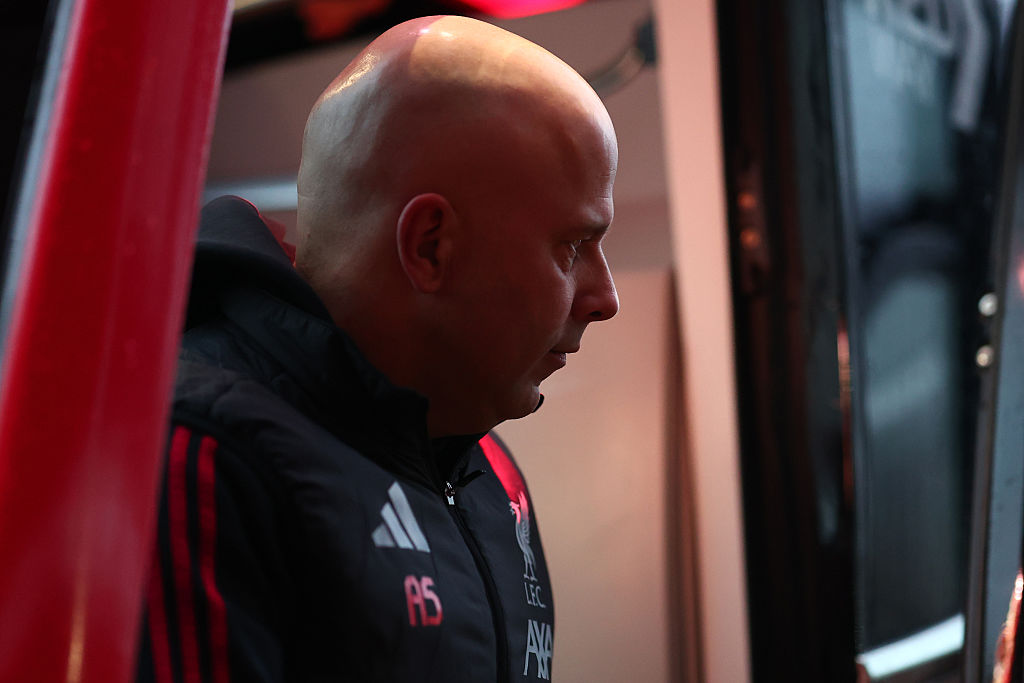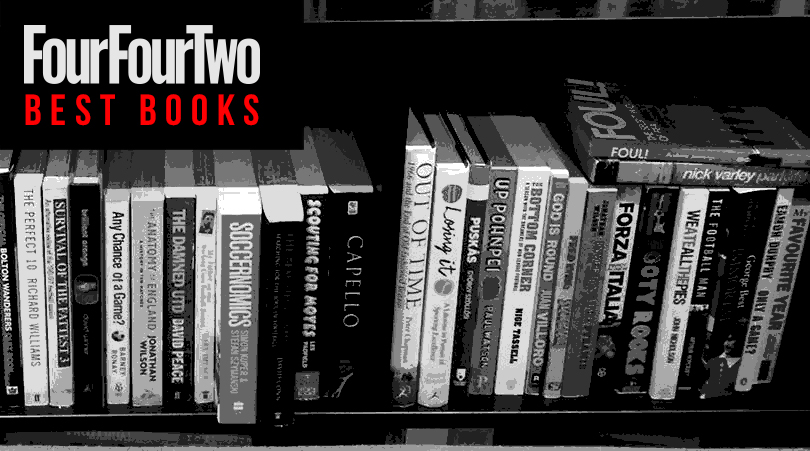
The 50 best football books ever
There are tens of thousands of football books. Many of them are rubbish, hackwork "auto"biographies of empty-headed players with neither the gall nor the wit to say anything of interest, or hastily slapped-together money-spinners spat out for the Christmas market.
On the other hand, there are dozens of brilliant football books which will entertain and educate you. And we at FourFourTwo love a good book, so we’ve compiled the best for you here. Whether it’s for a Christmas list, a holiday read or your own ongoing edification, please find the finest 50 football books money can buy…
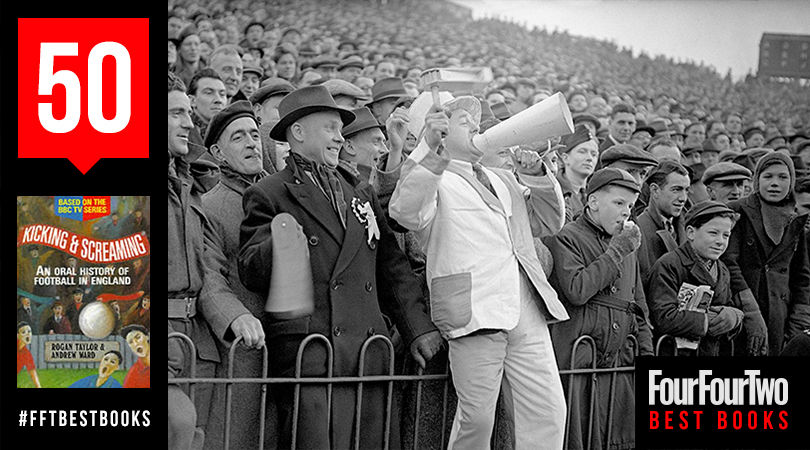
50. Kicking and Screaming
An Oral History Of Football In England – Rogan Taylor & Andrew Ward, 1995
A curious one to start with: conversations which became a TV programme which became a book. This is the only all-encompassing oral history of football in the 20th century, pulling together all the strands which make up football’s fabric.
The testimonies range from Zillwood March’s comments on football in 1900 to Bestie’s revelations about life in the ’60s. Whether it’s Sir Tom Finney’s “jumpers for goalposts”, Len Shackleton admitting to receiving £25 backhanders in the 1940s, or Ian Wright discussing astronomical wages in the 1990s, this is an indispensable guide to how football was dragged towards the 21st century.
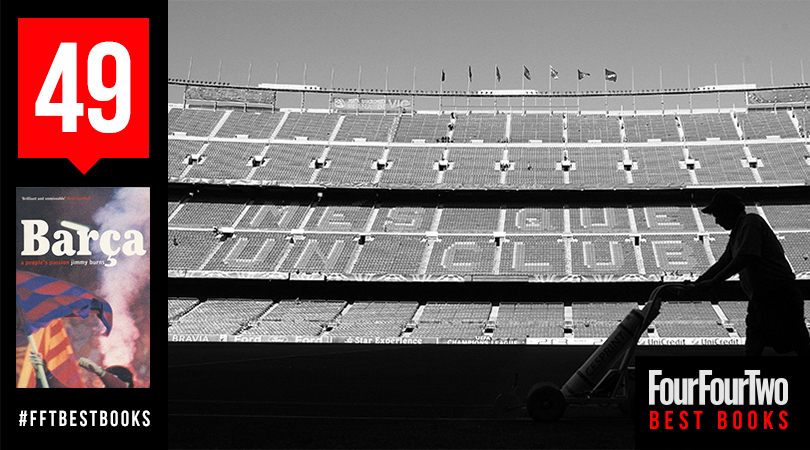
49. Barça
A People’s Passion – Jimmy Burns, 1999
Burns’ history of a club, 100 years of Catalan pride and some of the game’s most fascinating personalities (Cruyff, Maradona, Rinus Michels, Romario et al) is carefully researched, well observed, and packed with fascinating stories.
Barça may now be synonymous with the likes of Cruyff and Messi, but Burns gives a fair share of the limelight to those who have played vital cameo roles in the drama. Personalities like Patrick O’Connell, who hung on as coach even after his president had been shot by Franco loyalists, and Vic Buckingham, the English boss who restored Barça’s self-respect, despite reminding players of Henry Higgins, Rex Harrison’s character in My Fair Lady.
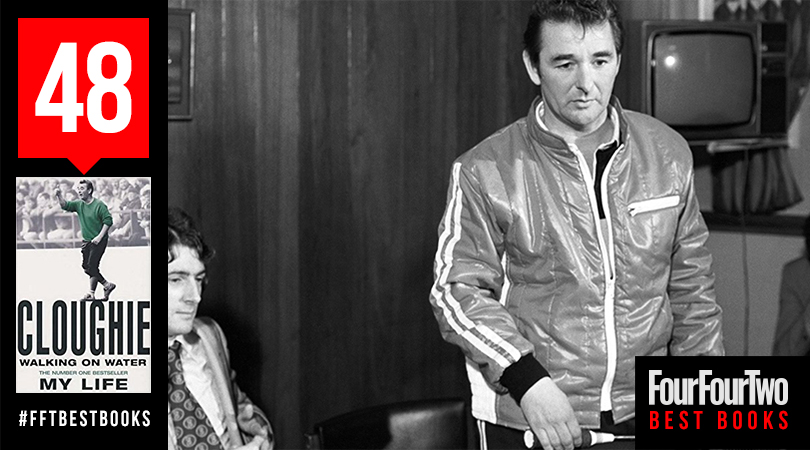
48. Cloughie
Walking on Water: The Autobiography – Brian Clough, 2002
As the second of Clough’s two autobiographies, Walking on Water contains some familiar tunes. Cloughie rants about the directors who incensed him over the years, and provides sharp insights into the successful sides he built at Derby and Nottingham Forest.
But many of the lines are delivered with a degree of mournfulness. Ol’ Big ’Ead expresses regret about his homophobia towards the late Justin Fashanu, and is candid about his alcoholism.
Perhaps the biggest sea-change lies in his attitude towards former assistant Peter Taylor, to whom the book is dedicated. The Forest manager missed Taylor both professionally and personally in his later years at Forest, and the guilt he felt after Taylor’s death in 1990 hastened his own physical decline.
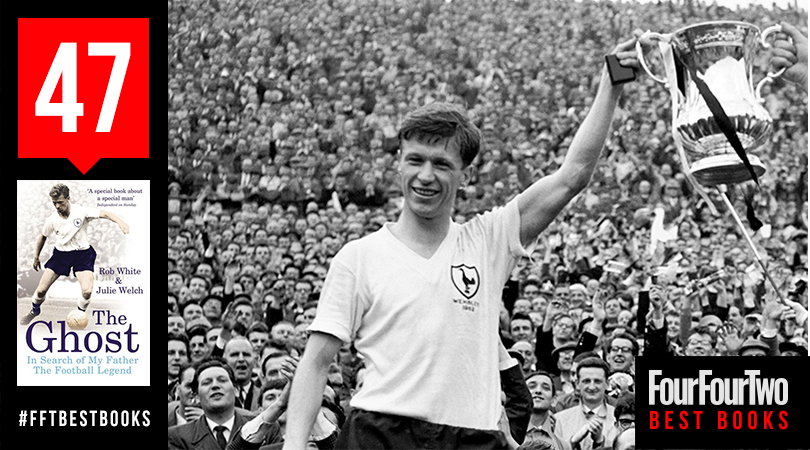
47. The Ghost
In Search Of My Father, The Football Legend – Rob White & Julie Welch, 2011
John White was an ever-present member of Tottenham’s legendary Double-winning side of 1960/61, his ability to creep into the opposition penalty area almost unnoticed earning him the nickname 'The Ghost'.
Then, on July 21, 1964, White was killed when the tree he was sheltering beneath during a rain-interrupted round of golf was struck by lightning. He was just 27, and left behind widow Sandra, two-year-old daughter Amanda, and six-month-old son Robert.
Naturally, Rob had no memory of his father, so, with the help of Julie Welch – a Spurs fan and Fleet Street's first female football writer – he set about tracking down John's friends, family and former team-mates in order to paint a picture of the man, rather than just the footballer.
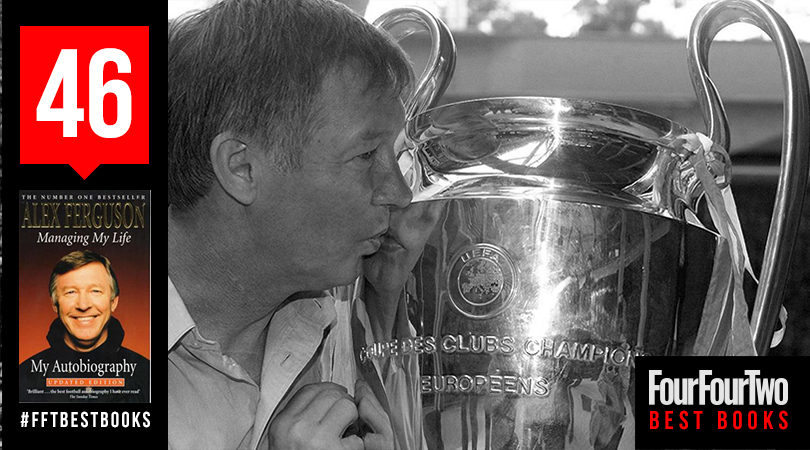
46. Managing My Life
My Autobiography – Alex Ferguson, 1999
After his side won the Treble in 1999, publishing houses fought the mother of all bidding wars for the rights to publish Sir Alex Ferguson’s autobiography. Hodder Headline’s successful £1.1 million bid was met with ridicule. How could they possibly make that back in sales, asked ‘those in the know’?
Michael Crick’s The Boss: The Many Sides of Alex Ferguson obviously presents a far more rounded view of the Scot: the bullying episodes and the United boss’s rocky relationship with several journalists are entirely absent from Managing My Life. But if you want to know why United dominated football in the ’90s, this book goes a long way to providing the answers.
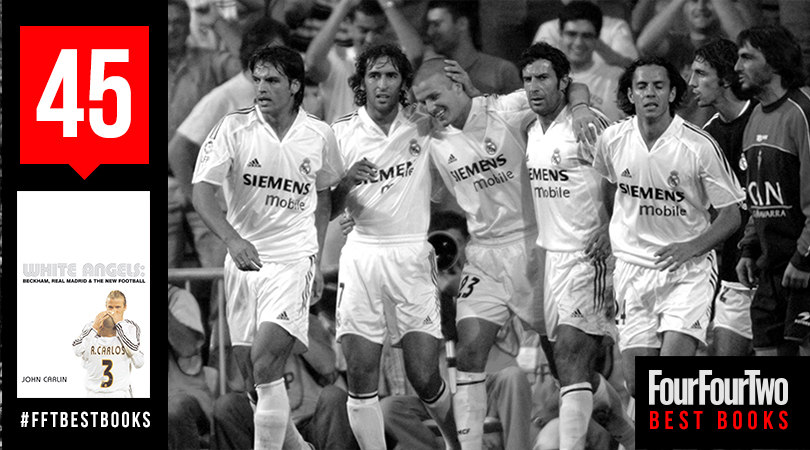
45. White Angels
Beckham, Real Madrid & The New Football – John Carlin, 2004
In 2004, too many trees were felled by publishers wanting to tell us what we already knew about El Becks and Real Madrid. This is the best of them, elevated by Carlin’s astonishing access and his talent.
Carlin offers a lovingly detailed portrait of the club and the galacticos experiment, which soon looks passé as sides like Porto win with teamwork. At times it feels like a well-written hagiography of Florentino Perez; directors even joke that they could win with a fan playing.
Such hubris is rewarded with defeat by Monaco and Fernando Morientes – a reject deemed insufficiently galactical – giving a valuable insight into what happens when a club believes its own hype.
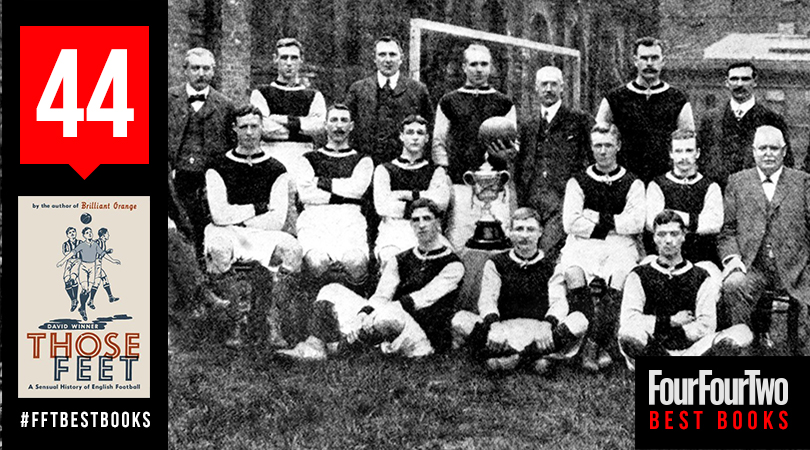
44. Those Feet
A Sensual History Of English Football – David Winner, 2005
A classic, if only for its finding that modern football was invented in Victorian public schools to keep boys from masturbating, the idea being that if boys were expending energy in teams, they couldn’t be alone engaging in “self-pollution”. The book takes the familiar idea of studying football culture in one country, and applies it to England itself, as if it were a foreign land.
Acclaimed football author Winner seizes on the rich and bizarre popular culture that has accreted around the English game – Roy of the Rovers, The Italian Job, Neasden FC in Private Eye, etc – and mines these artefacts for truths about England.
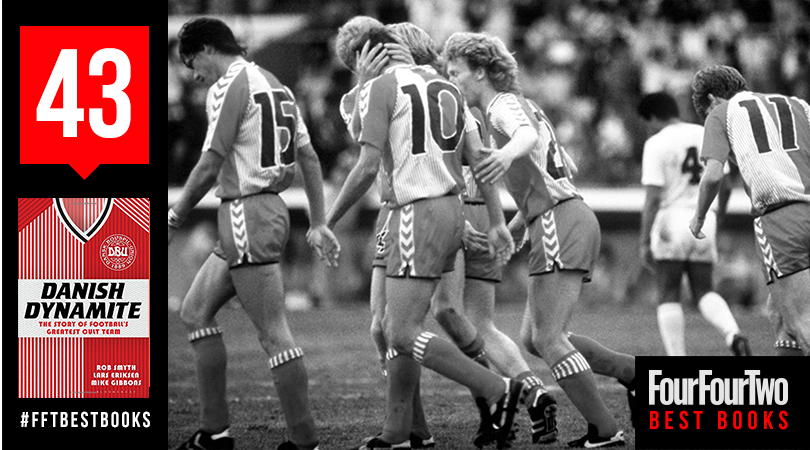
43. Danish Dynamite
The Story Of Football’s Greatest Cult Team – Rob Smyth, Lars Eriksen & Mike Gibbons, 2014
Fans of a certain age go misty-eyed at the mention of the mid-’80s Denmark side. A collection of colourful characters in an iconic Hummel kit, Sepp Piontek’s side – which contained Michael Laudrup, Jesper Olsen, Jan Molby, Soren Lerby and Preben Elkjaer – produced frequently mesmerising attacking football that seemed ahead of its time.
This team were effortless cool, and they followed Euro 84’s semi-final shootout defeat with an unforgettably explosive Mexico 86. Interviews with almost all the protagonists gives the book its backbone, while the authors’ boyish enthusiasm impels you to trawl YouTube for supporting evidence (it’s there, in spades: enjoy).
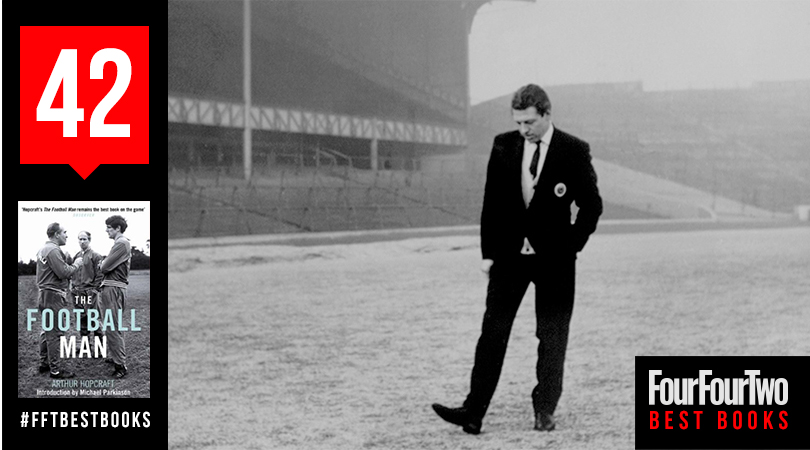
42. The Football Man
People And Passions In Soccer – Arthur Hopcraft, 1968
When this was first published in 1968, managers were sacked too quickly for too little cause, the game was complaining about bad publicity and violence among players was a cause of national concern. There’s much in this oft-quoted study of British football to reinforce the cliché that the more things change the more they stay the same, but there are revealing differences. Agents are barely mentioned, while professional referees are a pipe dream.
This enduring great owes much to Hopcraft’s obvious, anxious love for the game, the candour he inspires in his interviewees (Bobby Charlton and Don Revie among them) and his descriptive powers.
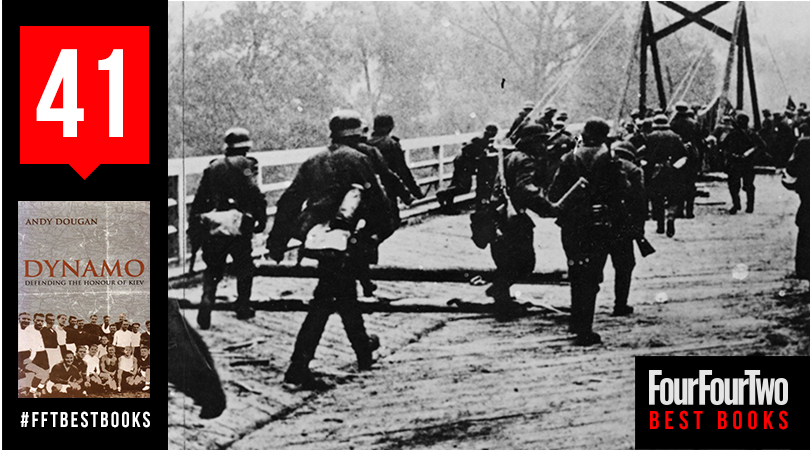
41. Dynamo
Defending The Honour Of Kiev – Andy Dougan, 2001
If the story is good enough, the rest will follow. This is a book of remarkable research, cutting through the myths that obscured what happened when Dynamo Kyiv played the Luftwaffe in 1942.
Communist myth had the SS shooting at the Ukrainians during the game, with survivors shot at the final whistle; the truth was rather more prosaic, but no less tragic. A team based around several Dynamo players working at the same bakery did beat a side representing the Luftwaffe, and afterwards all 11 were rounded up for interrogation.
Dougan shows how one died under torture, three were executed and one disappeared, and in rescuing their tale from propaganda does Ukrainian football a great service.
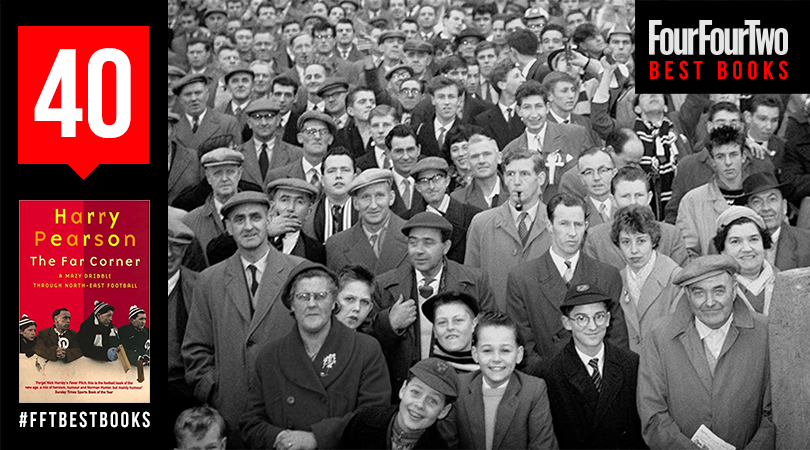
40. The Far Corner
A Mazy Dribble Through North-East Football – Harry Pearson, 1994
For exiles from that 50-mile strip from Ashington in the north to Teesside in the south, The Far Corner cannot be read without a lump in the throat. It’s hard to imagine anything else could be so evocative of the North-East. Football, of course, is the perfect medium for exploring the spirit of the region, that “far-off mythical place where the people were called ‘folk’, the beer was called ‘ale’, the men were called ‘lads’ and the lads were called ‘Jackie’.”
Pearson, himself a returned exile, manipulates the whiff of batter, leek-growing contests and the shopkeeper with the Shackleton obsession to produce a work that is moving, cynical, romantic, tragic, sentimental and hilarious.
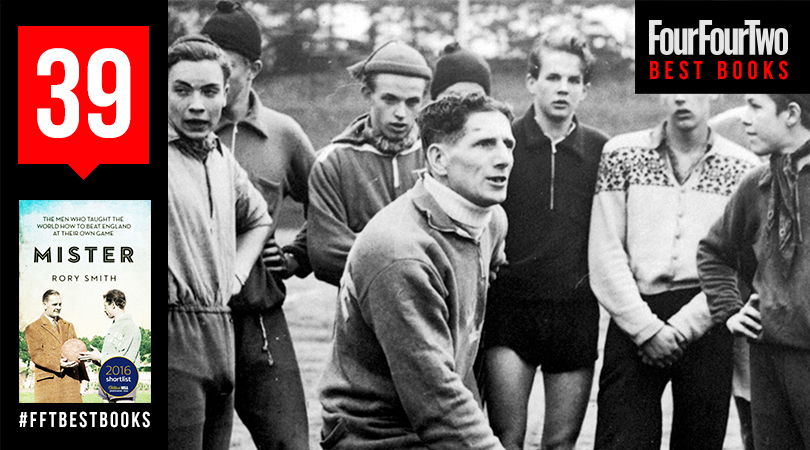
39. Mister
The Men Who Gave The World The Game – Rory Smith, 2016
England casts a long shadow. Across much of Europe and Latin America, the colloquialism for a coach is Mister: a lingering linguistic bootprint from the pioneering English managerial diaspora who spread their footballing ideas across the globe but remained little-known at home.
Understandably, some of the chapters tend to follow the same narrative arc: minor Football League player is forced to seek work abroad, finds success and acclaim, eventually returns due to homesickness or war but still can’t find a job in an England doggedly obsessed with muscular athleticism rather than clever coaching. But Smith teases out the personal, sometimes heartbreaking stories behind the Misters’ matches and medals.
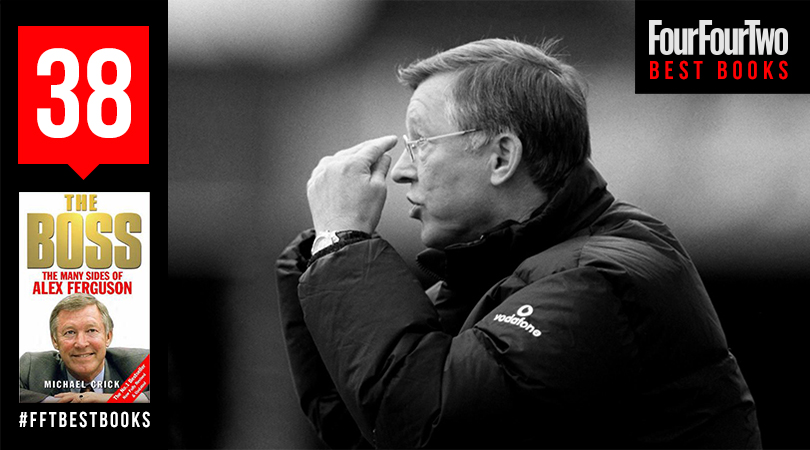
38. The Boss
The Many Sides Of Alex Ferguson – Michael Crick, 2002
Having debunked the myths surrounding leading Tories Jeffrey Archer and Michael Heseltine Newsnight reporter Michael Crick wrote an instant best-seller on the United boss. The “hairdryer” treatment, his dealings with agents, Fergie’s often fractious relationship with journalists – Crick showed that the Scot was a manager of many contradictions.
The fear Fergie invoked in others was never better illustrated than when the Manchester Evening News refused to grant Crick access to its United clippings files on the grounds that it might incur the boss’s wrath. The entire episode led the author to question whether he’d been transported to Mugabe’s Zimbabwe.
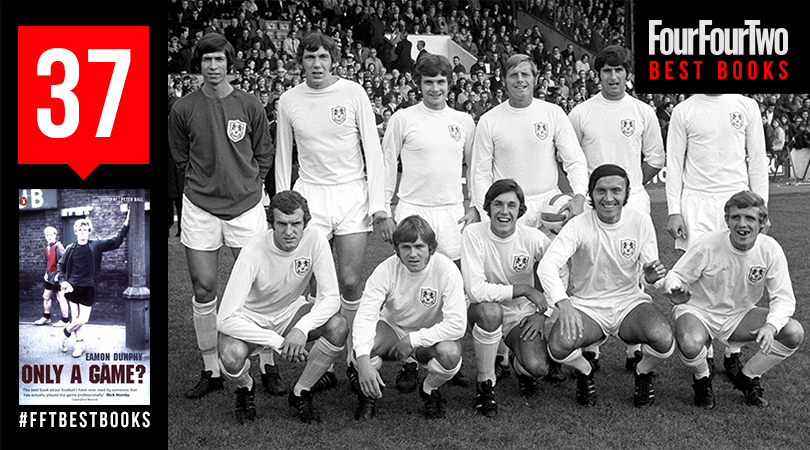
37. Only a Game?
The Diary Of A Professional Footballer – Eamon Dunphy, 1976
A book that answers the greatest question: what’s it really like to be a professional footballer? Nobody had done it before.
Only a Game? has the perfect narrative structure: Dunphy takes us from absurd pre-season hopes, through quarrels in the team, to being dropped and finally leaving Millwall after eight years. The author is honest about himself, emotionally literate in describing his team-mates (who come to life like characters in a good novel), and revealing of the insecurity with which footballers live. You get the sense that the life isn’t only unglamorous, but not much fun.
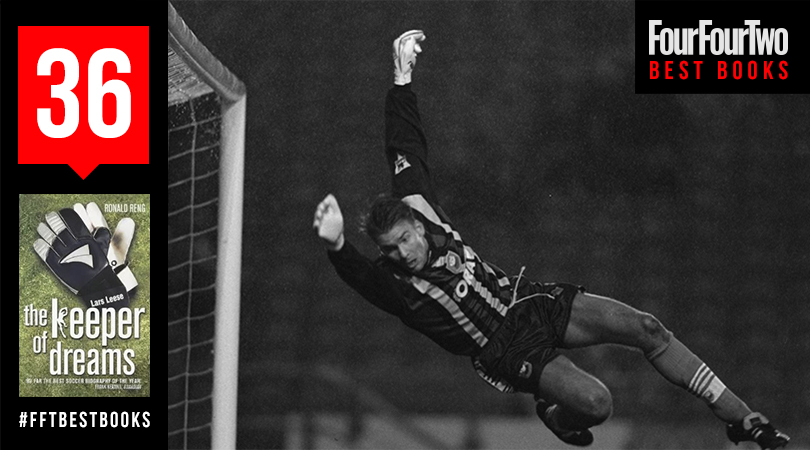
36. The Keeper Of Dreams
One Man’s Controversial Story Of Life In The English Premiership – Ronald Reng, 2003
A riveting memoir, Reng’s book tells the strange and fascinating tale of Lars Leese, a goalkeeper plucked from the German minor leagues (and computer software industry) to play for Barnsley in the Premier League who soon returns to obscurity in Germany.
The culture shock is immense: Leese puzzles over tactics, watches his team-mates rogering strippers on stage at the Christmas party and tries to handle the claustrophobic hysteria of a small Yorkshire town desperate to bask in football glory.
Among the many delights is the revelation that German keepers shout “Leo!” if they’re going to kick the ball in the air so defenders know to duck.
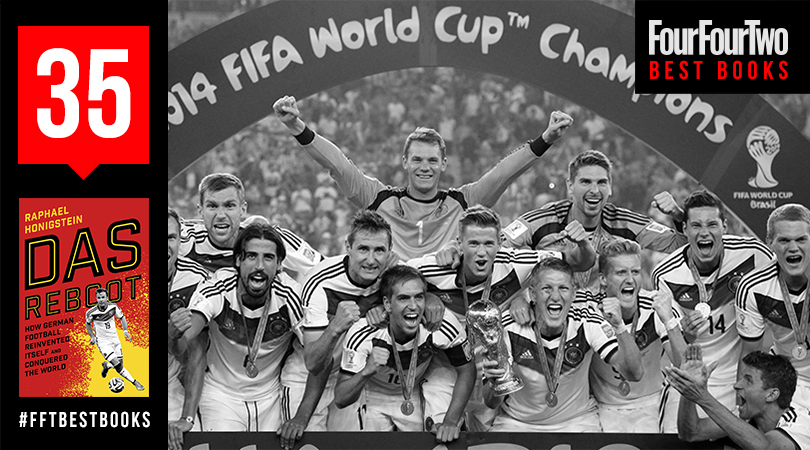
35. Das Reboot
How German Soccer Reinvented Itself And Changed The World – Raphael Honigstein, 2015
It helps a book to have a narrative, and here Honigstein tells the story of how the German national team made the journey from the despair of crashing out in the Euro 2004 group stage to winning the World Cup 10 years later.
The author interviews several key figures – including Jurgen Klinsmann, the man who revitalised a flagging team at the 2006 World Cup on home soil. Philipp Lahm and Thomas Muller also speak to Honigstein to provide the inside track on how the tournament was won in 2014.
It’s a fascinating read and a reminder that a national team’s fortunes can be turned around, given the right strategy and a real willingness to change.
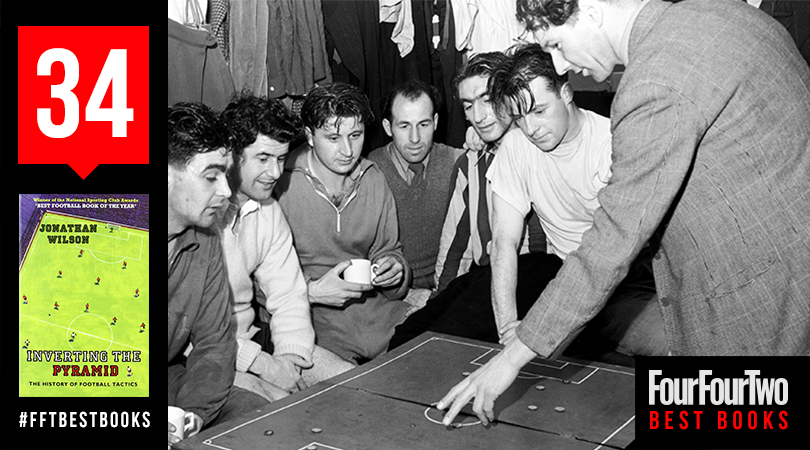
34. Inverting the Pyramid
The History Of Football Tactics – Jonathan Wilson, 2008
Tracing the development of various tactics over the last century and a half, Wilson spins a consistently interesting tale spanning various continents and fascinating characters who have helped football gradually invert the pyramid – from the attack-minded 2-3-5 to the sole strikers and packed back halves of today.
It’s to Wilson’s credit that although long, it’s far from dry. He rails against the British game’s entrenched anti-intellectualism and stages a passionate takedown of the statistical misreadings upon which Charles Reep and Charles Hughes did so much damage.
And although it may not be entirely new, all-encompassing or unarguable, it’s a thoroughly entertaining education for anyone wishing to be an internet quarterback.
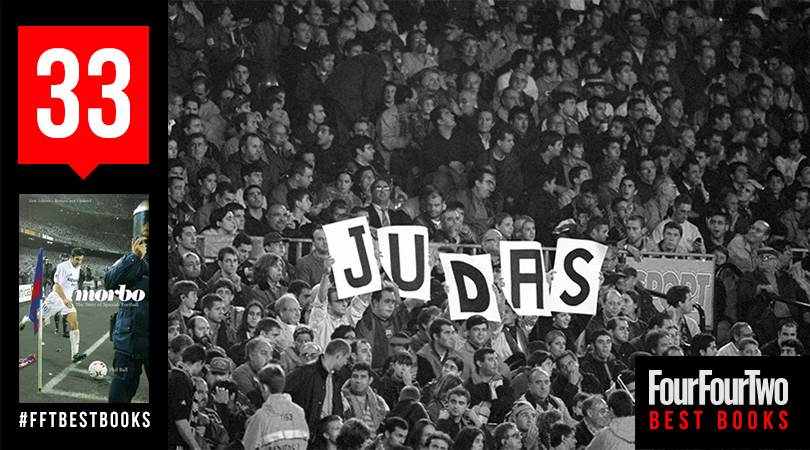
33. Morbo
The Story Of Spanish Football – Phil Ball, 2001
Ball is lucky to have published Morbo before the Galactic flood of books on Real Madrid – including two of his own – began, when there was very little in English on football in Spain. But this book’s appeal lasts because like Alex Bellos and David Winner, Ball wrote well, was funny, and knew more about his chosen country than just its football.
The bulk of his book is stories of morbo, a Spanish word that means something like needle or rivalry. It is, in effect, a guide to Spanish life, and is the perfect mix of the personal and the national.
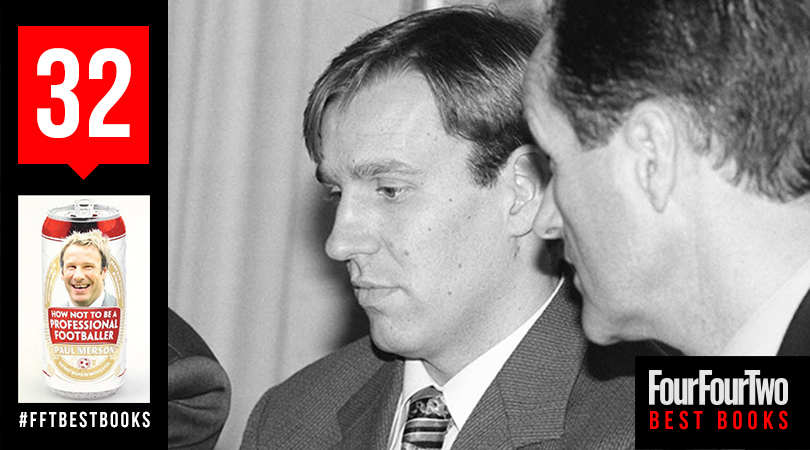
32. How Not To Be A Professional Footballer
Paul Merson, 2011
Forget about literary grandeur: Merse’s painfully honest rollercoaster ride through almost every level of English football won’t change the way you feel about the game. But it will take you on a mesmerising jaunt from the highs at trophy-winning Arsenal, to the lows of dealing with the intense pressures at the pinnacle of our national obsession.
From gambling away his wages to going straight at Villa and Pompey, Merson’s ‘lad banter’ balances out the sad self-destruction of the Soccer Saturday heavyweight, providing the inside line on that ruinous drinking culture inherent to the late ‘80s and early ‘90s.
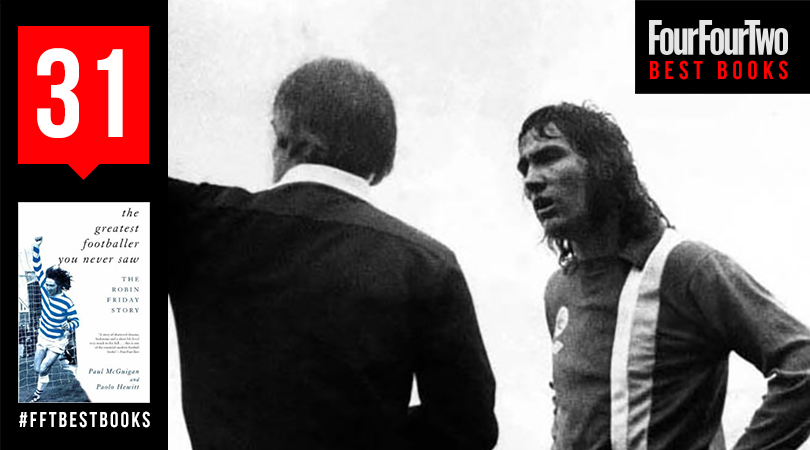
31. The Greatest Footballer You Never Saw
The Robin Friday Story – Paolo Hewitt & Paul McGuigan, 1998
Drinking binges, drug-fuelled rages, disappearing acts, jail sentences, an outrageous talent squandered, and a shockingly early death amid suspicious circumstances: meet Reading and Cardiff ’70s cult hero Robin Friday – football’s Keith Moon.
The Friday legend is perpetuated by the fact that so little footage of him remains. He spent his entire career in the lower leagues, and despite extensive research, Hewitt unearthed only a few grainy images of him in action.
But team-mates vouch for Friday’s unorthodox brand of genius. He set the tone after his Reading debut in 1973. When asked if he was satisfied with his debut goal, he replied: “Yeah, I could have back-heeled it in actually, but I thought that might be taking the p*** a bit.”
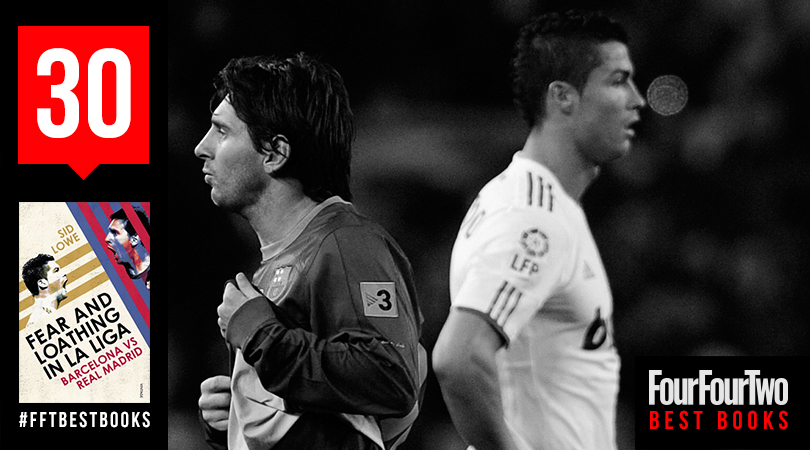
30. Fear and Loathing in La Liga
Barcelona vs Real Madrid – Sid Lowe, 2013
You might find this hard going at first, but stick with it. There’s much to be fascinated by in each club’s humble beginnings; of General Franco and the Catalan resistance; of Madrid’s mercurial Alfredo Di Stefano; of Barça’s brilliant László Kubala and his escape from Hungary dressed as a Russian soldier.
As Lowe digs deeper you’ll find interviews with legendary representatives on either side of the divide – Di Stefano, Johan Cruyff, Zinedine Zidane and Hristo Stoichkov. Yet these are all just characters in a much greater story, one in which each side has grown to despise and yet need the other to further validate its ideals.
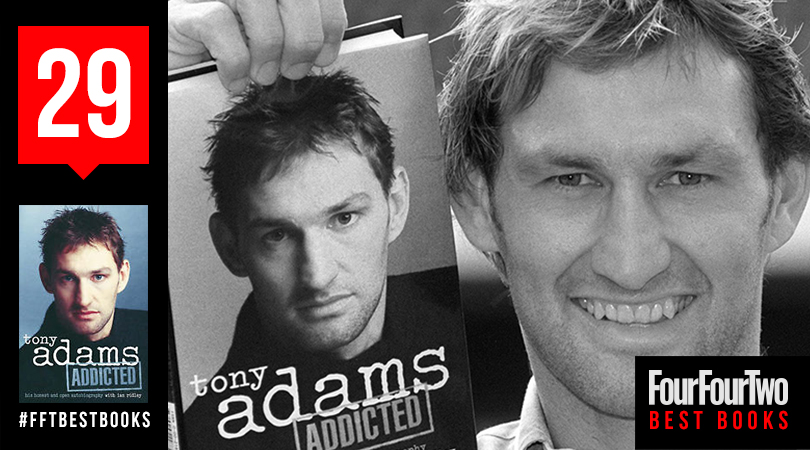
29. Addicted
Tony Adams with Ian Ridley, 1998
“For an autobiography to work,” explains writer Eamon Dunphy, “the subject has to be willing to discuss his faults. The footballer must show himself to be real and flawed.” Addicted was the first such autobiography. Adams talks with breathtaking honesty about the two addictions which have dominated his life – football and alcohol.
His career encompassed both the “win or lose, we're on the booze” culture of the ’80s and the steamed broccoli of Arsene’s Arsenal. His harrowing account of his descent into alcoholism drew criticism from those with weaker constitutions. The majority were simply dumbfounded by what they read, and concurred with Wenger’s comment: “Tony, I’m amazed you’re still actually with us.”
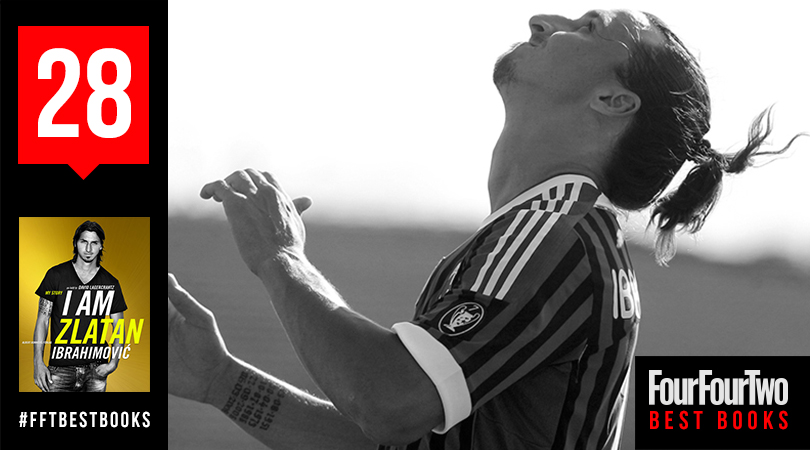
28. I Am Zlatan Ibrahimovic
Zlatan Ibrahimovic, 2013
Modern footballer autobiographies follow a pretty standard shtick. Player outlines tough childhood (ideally where ball is only friend), player gets picked up, player nearly gets cut, player works hard, player gets success, player lightly coats off rival without revealing too much.
I Am Zlatan Ibrahimovic is different. The Manchester United striker revels in his role as pantomime anti-hero, but goes deeper than mere Marmite pastiche. The searing honesty of how his relationship with Pep Guardiola disintegrated at Barcelona – which notably details how fragile that seemingly unshakable ego can actually be – is refreshing, as is how an unforgiving upbringing spending time between an overworked cleaner mother and indifferent alcoholic father shaped everything that followed.
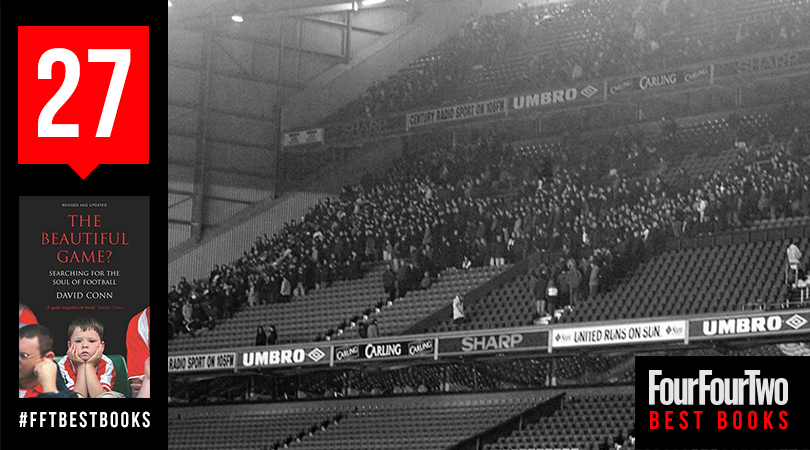
27. The Beautiful Game?
Searching For The Soul Of Football – David Conn, 2004
The lament for football’s lost golden age and the belief that commercial interests have sullied the game are nothing new, and books on the business of football can be unreadably dry, but The Beautiful Game? is passionate and bleakly humorous. Quite aside from the depth of the research, what sets Conn’s book above Tom Bower’s Broken Dreams is the sense that he really cares.
Broken Dreams was riddled with errors, both of fact and of spirit; Conn, simply by noting, for instance, that fans know intuitively why Notts County matter, taps into a depth of tradition of which Bower has no grasp. Bower just says football is in a very bad way; Conn tells us why it is worth putting right.
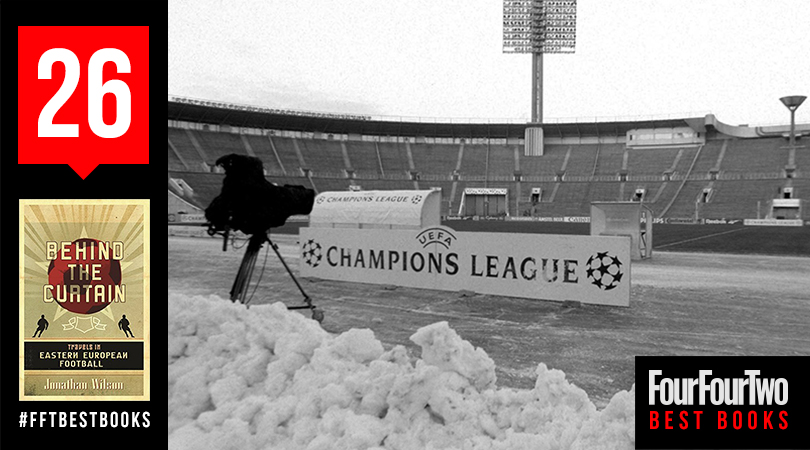
26. Behind The Curtain
Travels In Football In Eastern Europe – Jonathan Wilson, 2006
Before his more famous tactical opus Inverting the Pyramid, Wilson’s first book offered a fascinating peek behind the Iron Curtain into Eastern Europe. Dedicating each chapter to a country, or former super-state in the case of former Yugoslav states, Behind the Curtain shows just how influential politics has been on football in Europe’s outposts. From dictatorial influence in Romania with Nicola Ceausescu to the disintegration of Yugoslavia, there are stories aplenty.
Much of the talk of great teams from Dynamo Moscow to Dynamo Kiev and Steaua Bucharest is repeated in Inverting the Pyramid, but it’s the people to whom Wilson speaks for this book that implore the reader to care about teams they may otherwise ignore.
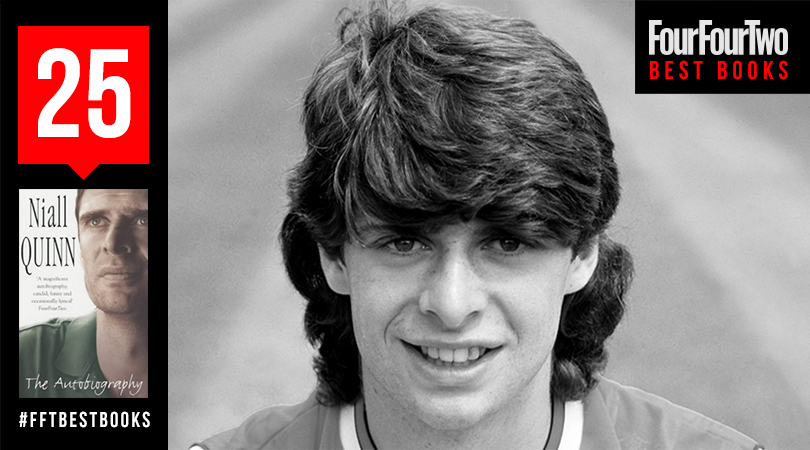
25. Niall Quinn
The Autobiography – Niall Quinn & Tom Humphries, 2002
There’s definitely something about Irish players and their autobiographies. Quinn’s book might not be as controversial as those of some of his compatriots, but it’s nonetheless a candid insight into a man generally recognised as one of the nicest in football. More than that, it’s a real book, written in a simple, dryly amusing, almost lyrical style that, even if it wasn’t, could have been written by Quinn and yet still qualifies as proper writing.
Football happens to have been Quinn’s life, but his autobiography is just as much about regret, about moving on and about remaining a decent man in a world that is profoundly indecent.
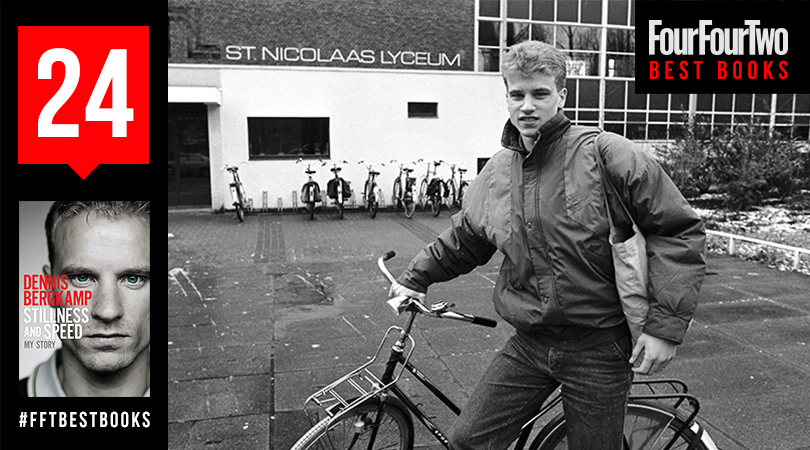
24. Stillness and Speed
My Story – Dennis Bergkamp, 2013
In the same way his genius produced something out of the ordinary on the pitch, Bergkamp’s book offers an alternative to the birds, booze and fast cars format most players follow when it comes to autobiographies. The Dutchman’s love of the game and philosophies on how it should be played pour off the pages, with anecdotes and insight from his time at Ajax, Inter and Arsenal.
Bergkamp delivers his footballing sermon through multiple voices – not just his own. We hear from former team-mates and coaches and co-author David Winner throughout. Stillness and Speed is for football fans, not just impassioned Gooners.
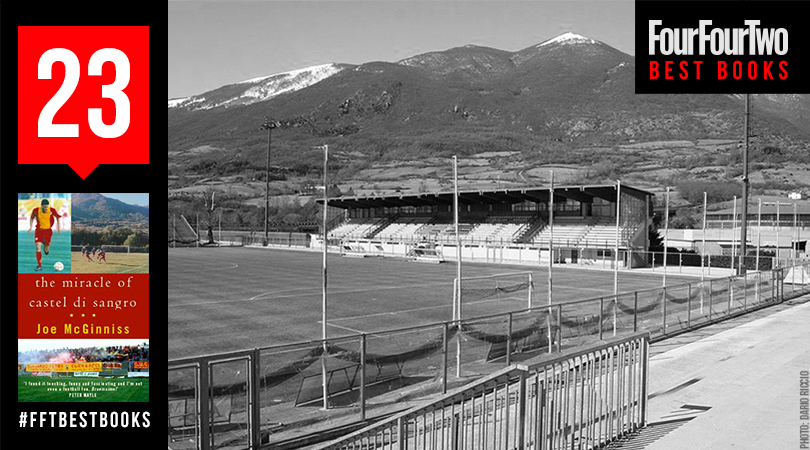
23. The Miracle Of Castel Di Sangro
A Tale Of Passion And Folly In The Heart Of Italy – Joe McGinniss, 1999
This hilarious, compelling, often misunderstood book easily disproved the notion that Americans can’t write about soccer. McGinniss, who made his name writing about US politics and his fortune penning true-crime bestsellers, details the rise of Castel di Sangro, from a town of 5,000 people, to Serie B.
But this is as much The Sopranos as Field of Dreams. A season of joy, tragedy, hilarity and courage draws to a shabby close with the team throwing a game as a player reminds the author: “Remember, we are the land of Dante but also of Machiavelli.”
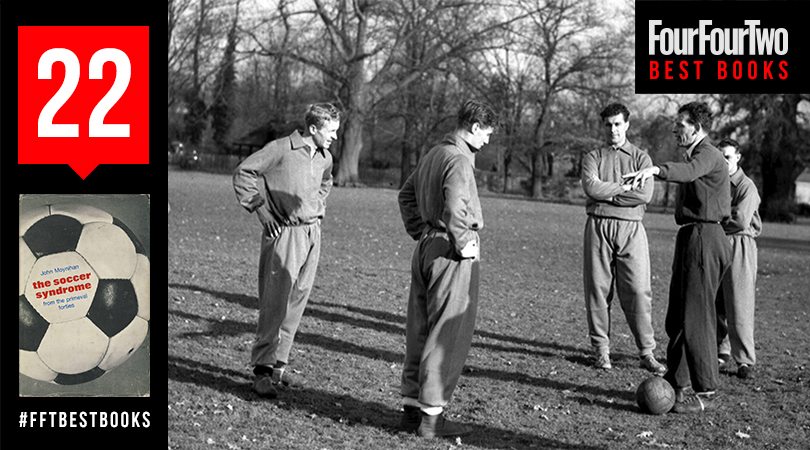
22. The Soccer Syndrome
John Moynihan, 1966
First released four months before the 1966 World Cup, John Moynihan’s The Soccer Syndrome is more a personal ode to post-war football, Brylcreem and all, rather than any kind of assessment of England’s chances at the upcoming tournament. And it’s all the better for it.
Football is at the heart of every chapter here, but witnessed through the prism of the SundayTelegraph football reporter’s experiences and life journey along the way.
From a childhood spent face-down in the dirt at a rugby school to watching Pele and Garrincha light up the 1958 World Cup Final over a lovelorn female companion’s shoulder in a Paris café, Moynihan’s focus on events and fandom bring this book alive.
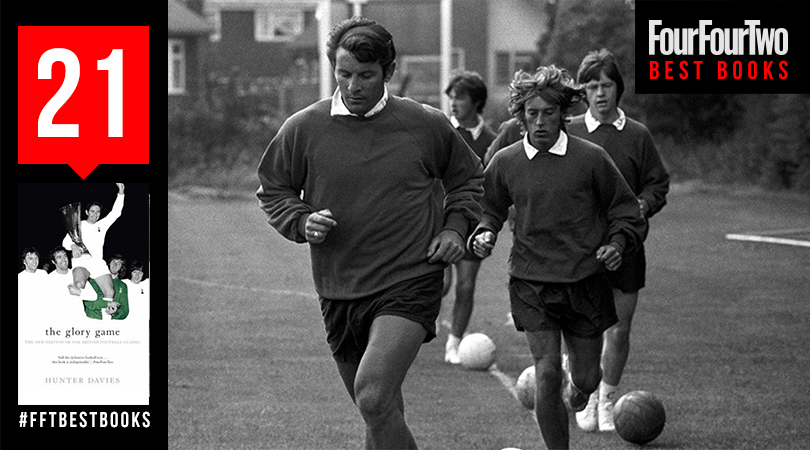
21. The Glory Game
Hunter Davies, 1972
“There is no way that a writer these days could possibly do what I did in The Glory Game,” explains Hunter Davies. “He or she wouldn’t be able to get past the minefield of agents, lawyers and officials.”
In the 1971/72 season, Davies was granted unprecedented access to Tottenham boss Bill Nicholson and his 19-man first-team pool. With no official contract behind him, he admits to “worming my way in” at White Hart Lane, and convincing all those concerned that an “inside story” book charting Spurs’ season would be a worthwhile project. The Glory Game defined the fly-on-the-wall sports book.
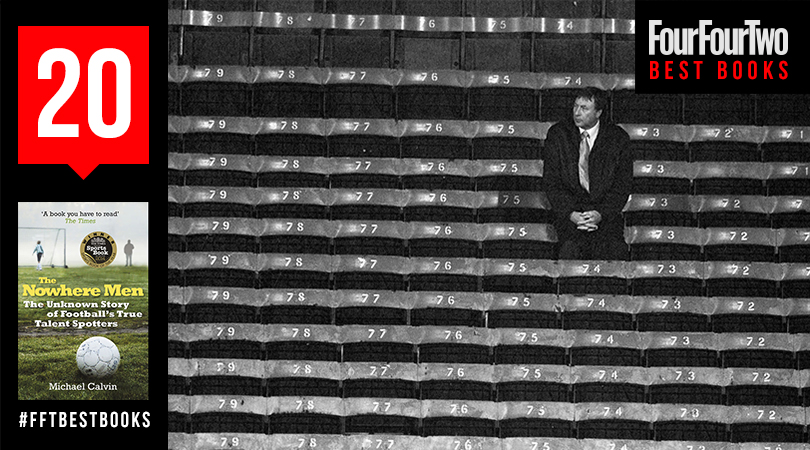
20. The Nowhere Men
The Unknown Story Of Football’s True Talent Spotters – Michael Calvin, 2013
On the surface, scouting may seem one of football’s more glamorous roles. There’s little not to love about the idea of getting paid to watch footballers for a living, always with the dangling carrot of unearthing that Next Big Thing.
That’s the dream, anyway: but, as usual, reality bites hard. Scouting jobs – the few that are available, anyway – are rarely so mystical. With a high-profile role comes high-level pressure – just ask former Tottenham and Liverpool director of football Damien Comolli, as Calvin does – and, like the managers these scouts ultimately work for, job security is predictably woeful.
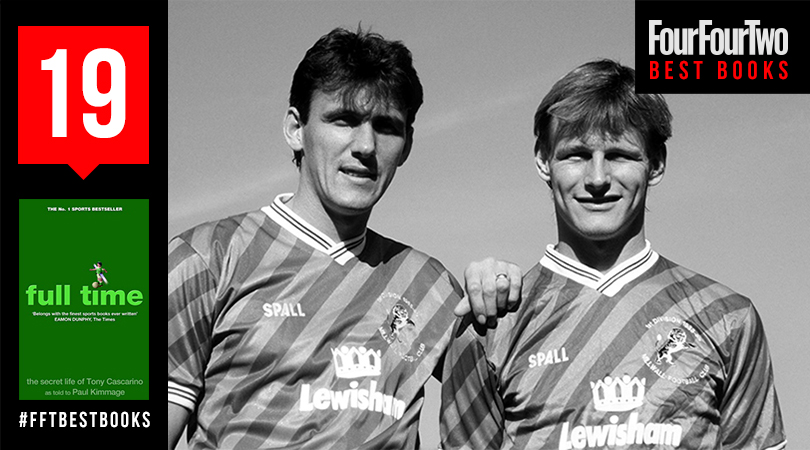
19. Full Time
The Secret Life of Tony Cascarino – as told to Paul Kimmage, 2000
Full Time works on two levels. On the one hand, there are the testosterone-fuelled stories of dressing-room banter from his time at Gillingham, Millwall, Villa, Celtic, Chelsea and Marseille, numerous references to Jack Charlton’s potty mouth, and Glenn Hoddle’s suspect humour.
But it also transcends football issues. Cascarino’s troubled relationship with his father and his painful separation from his wife and sons are themes which run throughout the story.
Since its publication in 2000, Cascarino has adapted well to “real life” and enjoys a fulfilling media career. “But for every Cascarino,” explains Kimmage, “there are two players who can’t adapt at all. The money makes little difference at all.” Gazza would doubtless concur.
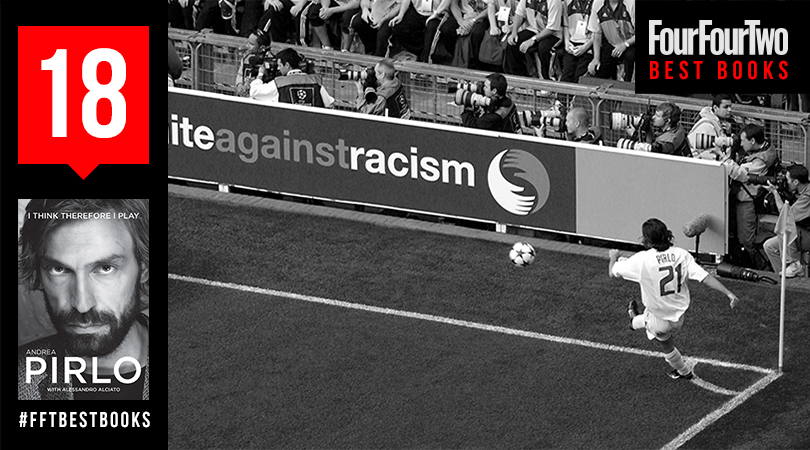
18. I Think Therefore I Play
Andrea Pirlo, 2014
Former Milan and Juventus midfielder Andrea Pirlo’s tome I Think Therefore I Play is short, sharp, but packed to bursting with everything you want. Clocking in at only 150 pages, you could read it in the time it takes Pirlo to misplace two passes.
From transfers that never happened – including Pirlo nearly joining Barcelona and a fascinating description of Pep Guardiola’s office – to playing PlayStation hours before winning the World Cup, the book is a fascinating, non-linear route into the mind of football’s greatest wine-loving luxury.
There are points where he descends into pseudo-intellectual self-parody – like describing the warm-up as “nothing but masturbation for conditioning coaches” – but I Think Therefore I Play is the perfect distillation of what a football autobiography should be.
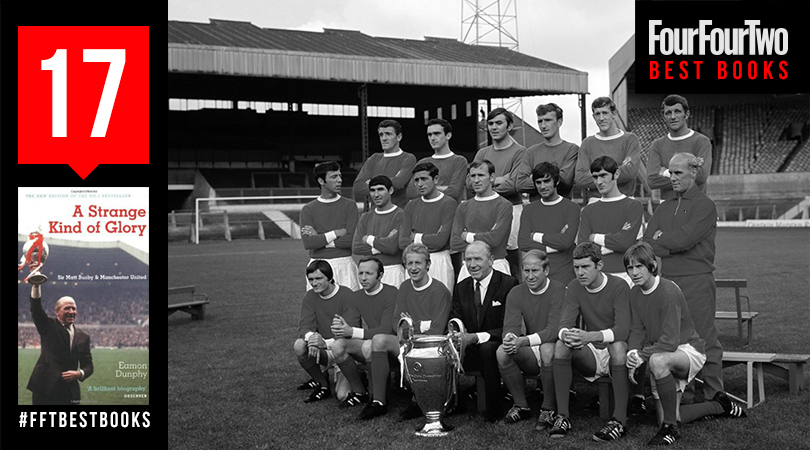
17. A Strange Kind Of Glory
Sir Matt Busby & Manchester United – Eamon Dunphy, 1991
“I called it A Strange Kind of Glory because that’s what it was,” explains Dunphy. “Here’s a man who created all this legendary magnificence… who made Manchester United into more than just an ordinary club and yet was ultimately powerless, ending up in a semi-detached house in Chorlton.”
The book traces the corrupt and corrupting rise of professional football to put Busby into context. Dunphy makes you feel as if you are inside the club: with Busby on the training ground; watching the Busby Babes and the 1968 European Cup-winning side emerge; and eavesdropping as players, in the early 1960s, wonder if Busby has lost it.
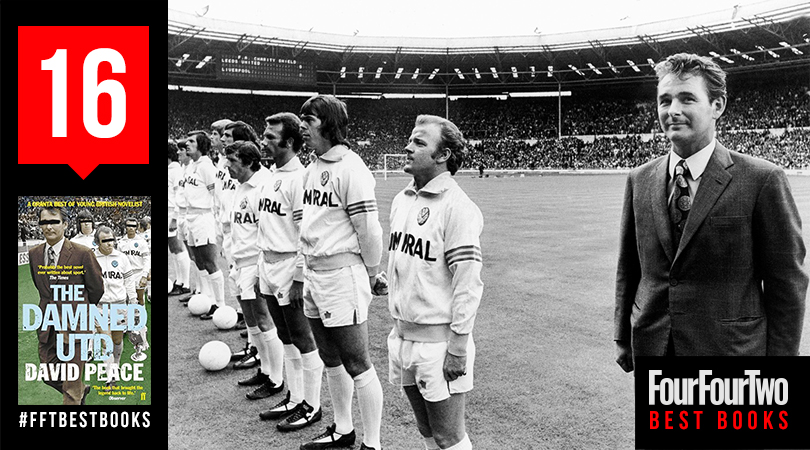
16. The Damned Utd
David Peace, 2006
Peace described The Damned Utd as an “occult history of Leeds United”, but it’s nothing of the sort. It’s a brutally powerful first-person stream-of-consciousness based around Brian Clough’s 44-day stint at the club he hated, attempting to replace the manager he despised, Don Revie.
Peace maintains a taut rhythm by alternating italicised flashbacks to Clough’s stressful but successful rise to the top of management (and rancorous rivalry with Revie) with day-by-day descriptions of the six weeks at Leeds, all in the present tense (and boy, is it tense).
It’s not an accurate history – Johnny Giles sued and won – but it’s acutely moving, a terrifying glimpse into the mind of a man going mad.
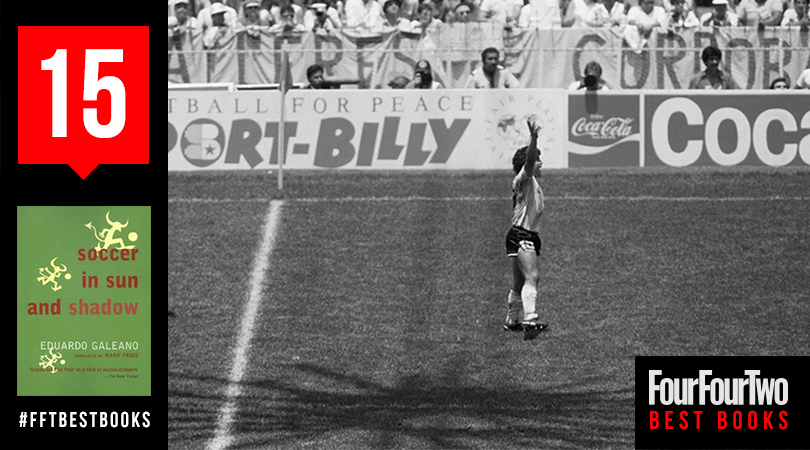
15. Football In Sun And Shadow
Eduardo Galeano, 1997
American sportswriter George Plimpton said the smaller the ball, the greater the literature. He hadn’t read this remarkable, poetic, episodic history by a left-wing Uruguayan writer who once asked “Why is football like God? Each inspires devotion among believers and distrust among intellectuals.”
The book consists of short stories on a theme – a famous game, a spectacular goal, a great player – written in a lyrical style which could quickly grate yet somehow doesn’t. Some episodes, like the tale of Brazil’s greatest goalscorer – Arthur Friedenreich, not Pele – read like something out of Gabriel Garcia Marquez’s magic realist fiction.
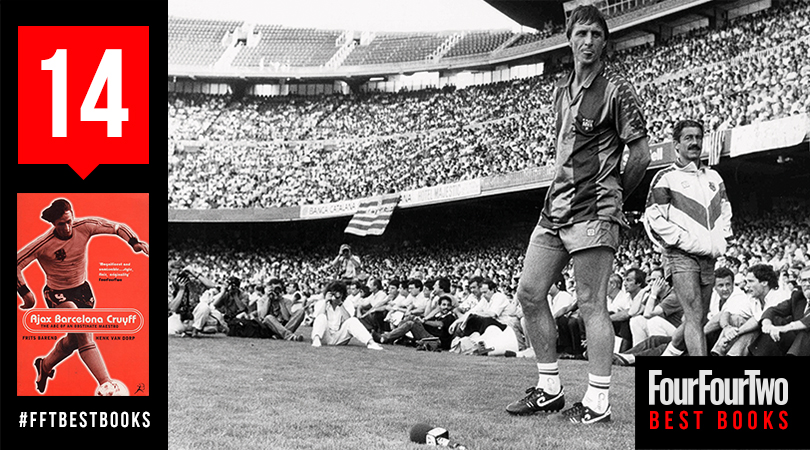
14. Ajax Barcelona Cruyff
The ABC Of An Obstinate Maestro – Frits Barend & Henk Van Dorp, 1999
ABC pulls together articles and interviews which the authors conducted with Cruyff over 35 years. His obstinacy (“If I’d wanted you to understand I’d have explained it better”) and aloofness (Interviewer: “I don’t understand a word”; Cruyff: “Yes, but I’m only suitable for the people at the top”) is apparent throughout.
But David Winner, who translated ABC into English, noted: “It’s a bit of a misnomer to think that all Dutch footballers are like Cruyff. He’s deliberately elliptical in interviews, and has this habit of referring to himself as ‘you’. He seeks to be incomprehensible, it seems.” Cruyff argued: “It’s the way I talk, so why not put it in the book?”. Too Dutch for the Dutch? The mind boggles.
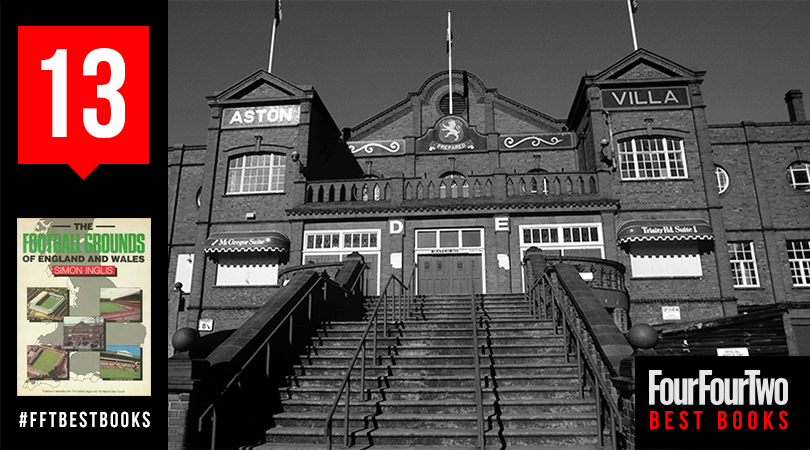
13. The Football Grounds of England and Wales
Simon Inglis, 1983
Inglis is football’s answer to Nikolaus Pevsner: the man who single-handedly made us appreciate our extraordinarily rich sporting architectural heritage.
As an architectural history student in the 1970s, Inglis spent weekends biking around the cities of Britain, checking out cathedrals and football grounds, an eccentric obsession triggered by his boyhood love of Aston Villa’s old Trinity Road stand. There was plenty to read on religious buildings, but nothing on cathedrals of football.
Years later, as a freelance journalist, he decided to follow his passion and chronicle the history and design of every one of Britain’s 92 league grounds. In snobbish architectural circles, he may as well have written Road Haulage Depots of Britain.
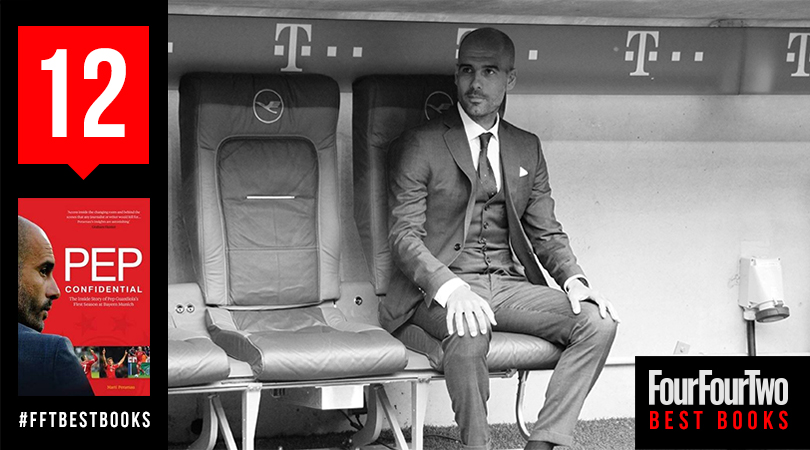
12. Pep Confidential
Marti Perarnau, 2014
Manchester City manager Pep Guardiola famously doesn’t give one-on-one interviews. So, how do you write a book about the most highly respected coach in the world’s attempts to reinvent a club in his first season as manager, without actually talking to him? You do what Marti Perarnau did and study everything from afar for 12 months at Bayern Munich.
Crucially, and most interestingly, Perarnau gets Guardiola to distance himself from the philosophy with which he is most associated, tiki-taka. “It’s a load of sh*t,” says Pep. “A made-up term.” And Perarnau explains why, through the training sessions he witnesses, in this genuinely fascinating insight into the innermost machinations of the Guardiola psyche.
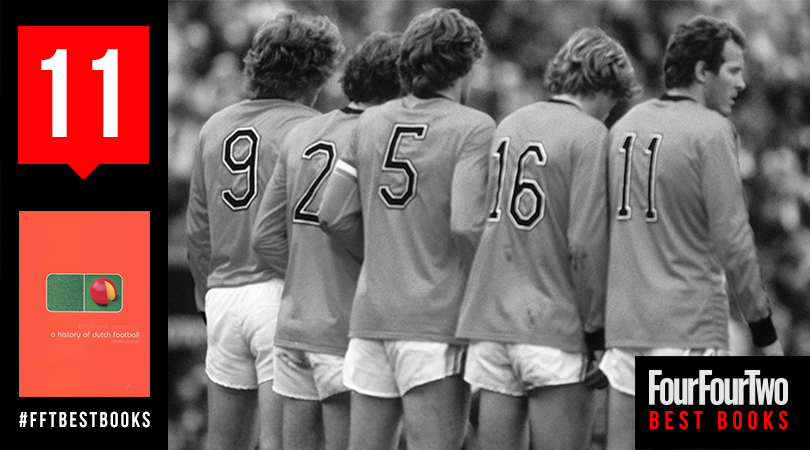
11. Brilliant Orange
The Neurotic Genius Of Dutch Football – David Winner, 2000
“I wanted it to be quirky and unusual and to ensure it looked at football in a different way,” explains Brilliant Orange’s cover designer Will Webb. This book, which takes an idiosyncratic look at Dutch football, leapt off the shelves by virtue of the ball of Edam and Astroturf on the front framed by, well, brilliant orange.
Winner interviews former stars like Rep and Rensenbrink, but also offers a unique insight into the psyche of the Dutch, and goes some way to explaining why the team often underachieves in big matches. Winner confesses to being “fascinated by the correlation between football and space, and football and architecture”. Not your average football book. Not your average football team.
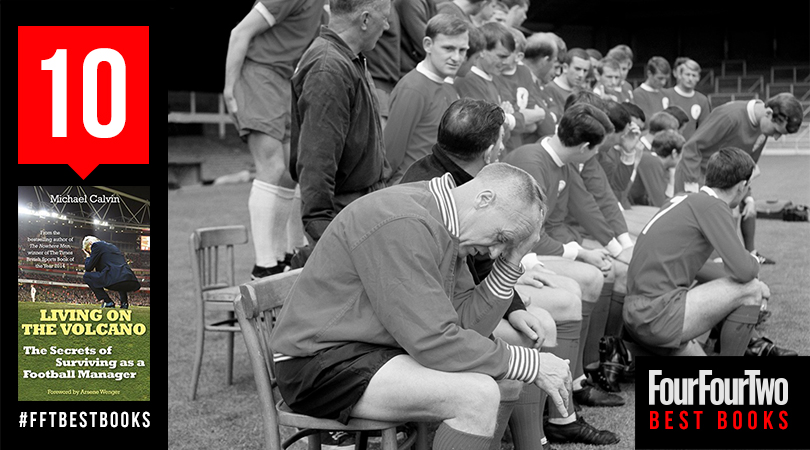
10. Living on the Volcano
The Secrets Of Surviving As A Football Manager – Michael Calvin, 2015
What makes the modern manager tick? How does the pressure of a budget of millions affect a person? What's left of a man when his job of years is taken away instantly? This insight into leading football managers' lives reveals precisely what things are like at the epicentre of the chaos that is our favoured game.
A collection of portraits are neatly interwoven as some of the leading helmsmen in English club football talk candidly about their route to the top, the day-to-day and what they stand for in one-to-one interviews with the author. You'll learn a lot more than just about coaching football: there are lessons for life here between the tales of obsession, camaraderie and primal competitive one-upmanship.
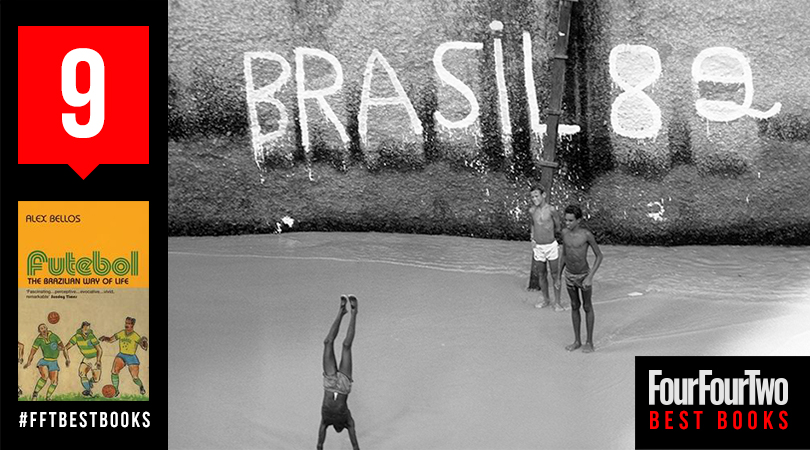
9. Futebol
The Brazilian Way of Life – Alex Bellos, 2002
The format was familiar: by the time Futebol appeared, in 2002, we’d already enjoyed excellent books on football in one country by David Winner (Holland) and Phil Ball (Spain), with several others in the pipeline. Yet nobody had tackled the ultimate football country since the American sociologist Janet Lever wrote the obscure but wonderful Soccer Madness in 1983.
What makes Futebol special is its legwork. Not only does Bellos speak to everyone – the man who designed Brazil’s yellow-blue-white strip, the man who scored the winner against Brazil in the 1950 final, beauty queens, priests – but he also goes everywhere and does everything.
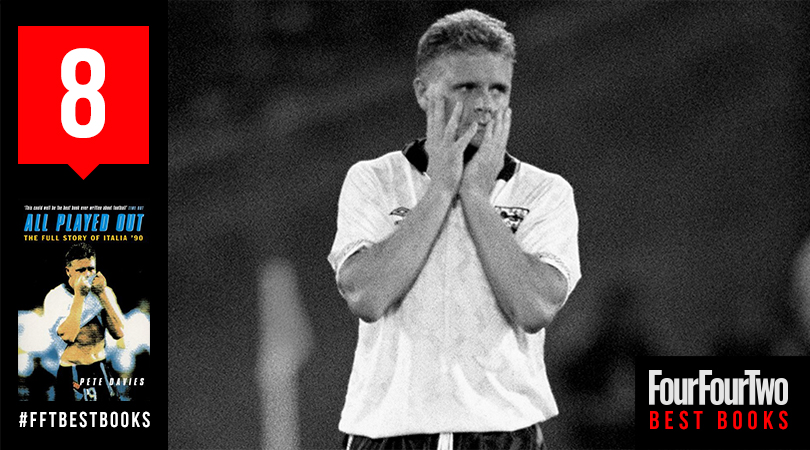
8. All Played Out
The Story Of Italia 90 – Pete Davies, 1990
This riveting, passionately written inside story of the England team and its fans during Italia 90 made ‘football literature’ mean more than daft ghosted biographies. “There had been good football books before,” recalls Davies, “but they were rare, and there’d been bugger all in the 1980s.
“I wanted football to have a proper place in popular culture; I thought someone should say ‘Not all of us are lunatics. We have legitimate emotional reasons for watching this game, which is incredibly important culturally and matters to everyone in the world.’”
Even more remarkable than winning the trust of England boss Bobby Robson and his players was persuading a major publisher to take a gamble on a genre that didn’t yet exist: it changed the industry. You may also find this called One Night In Turin to tie in with a documentary film it inspired.
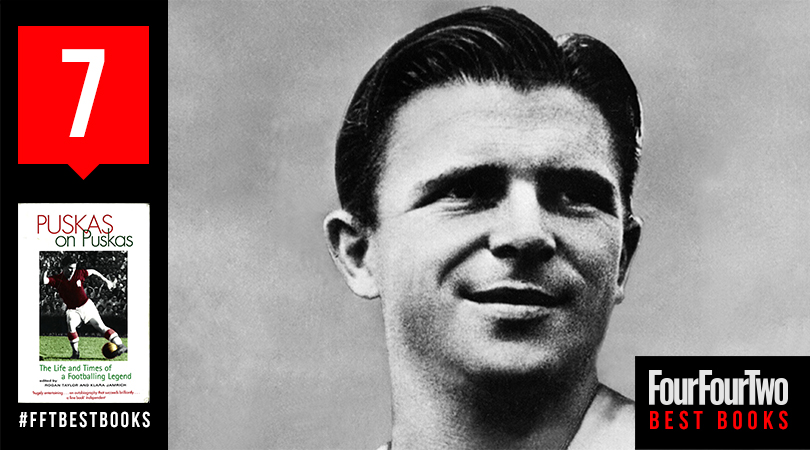
7. Puskas on Puskas
The Life And Times Of A Footballing Legend – Rogan Taylor & Klara Jamrich, 1998
A warm, intelligent and revealing biography which fuses history and politics with the study of genius to produce a unique portrait of the great Hungarian, Ferenc Puskas. A labour of love, it was born of Taylor’s urge to know his boyhood hero.
One early fruit of this was an unmade film script with Stalin dying in the opening scene with the word “Puskas!” on his lips. In 1993, researching the TV series Kicking and Screaming, Taylor met Puskas and persuaded him to tell the story of his unparalleled career, first with Hungary and later as kingpin (with Di Stefano) of the great Real Madrid.
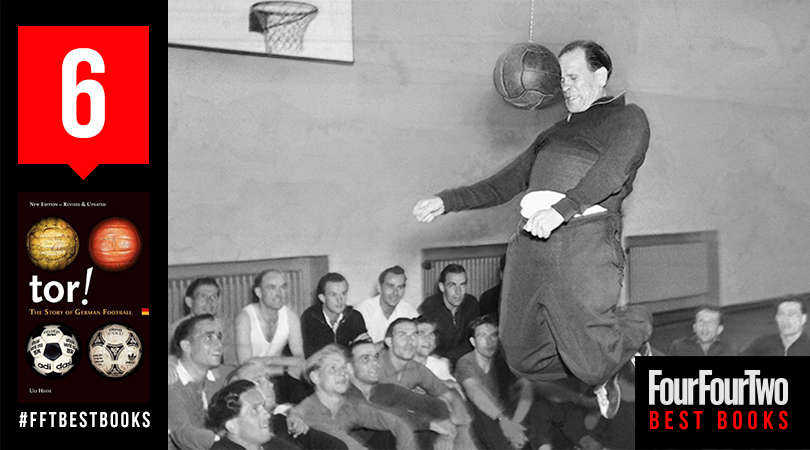
6. Tor!
Uli Hesse, 2003
Few football cultures inspire as many clichés as Germany’s: ruthless, defensive, boringly efficient. Such labels are proved hopelessly inaccurate by this book. In Hesse’s capable hands, the history of German football seems more entertaining, unpredictable and scandal-infested than England’s.
While British mavericks have usually been confined to the margins, Germany’s social misfits and rebels – from Franz Beckenbauer to Gunter Netzer and Lothar Matthaus – have often taken centre stage. And the startling chapter on East German football says more in a few pages about totalitariaism than most books on the subject.
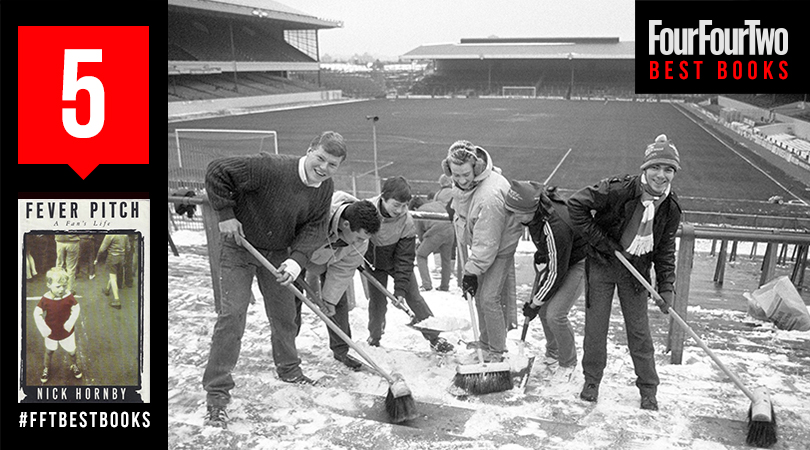
5. Fever Pitch
Nick Hornby, 1993
A completely original book. Hornby didn’t start the new wave of football writing – Pete Davies did – but he was the first British writer to examine the apparently unremarkable experience of being a fan.
Following the theory of fandom as therapy, Hornby describes how he used Arsenal to escape from his parents’ divorce, problems with women, the question of what to do with his life, and so on. He treats his fandom as a problem, as something not entirely healthy. This set him apart from the previous notion of fandom as a hobby, and from his imitators who wrote cutesy accounts of watching bad football in the rain without any of Hornby’s honesty about their own lives.
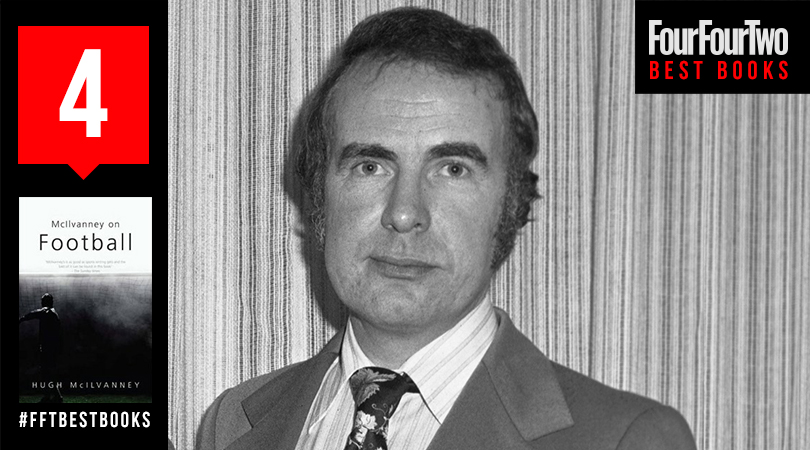
4. McIlvanney on Football
Hugh McIlvanney, 1994
From 1963 to 2016, McIlvanney wrote about sport for the Observer and the SundayTimes. Released a year after his departure from the former, this collection came out at a fascinating hinge in the timeline of the European game, a couple of seasons into the era of the Premier League and Champions League.
It remains essential reading from a witness to history. Starting with a report filed from the 1960 European Cup Final at Hampden between Real Madrid and Eintracht Frankfurt, it goes on to examine two dozen of the game’s giants – Busby, Shankly, Stein, Ferguson and Dalglish, all of whom hailed like McIlvanney from Scotland’s industrial south-west – plus Clough, Paisley, Finney, Greaves, Brady, Beckenbauer, Barnes and Best.
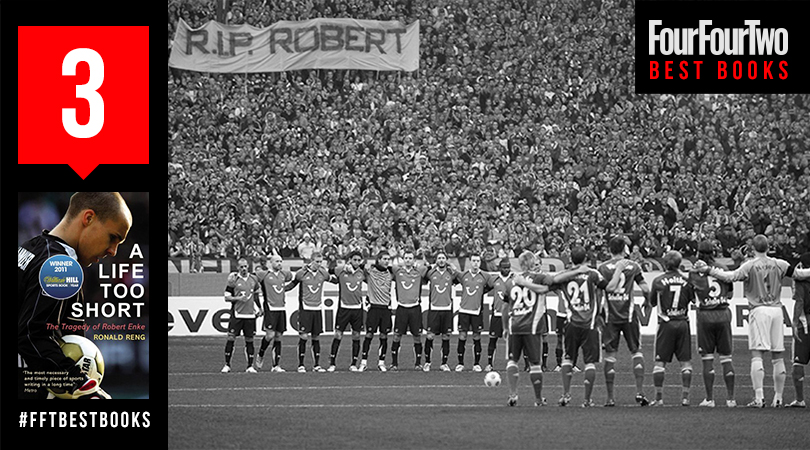
3. A Life Too Short
The Tragedy Of Robert Enke – Ronald Reng, 2011
Enke, destined to become Germany's first-choice goalkeeper at the 2010 World Cup Finals, had been a friend of the author since 2002, and they had loosely planned to write a book together on his football career.
Enke kept notes so that "I don't forget anything," and he wanted the book to be published after his football career ended, so that he could finally open up about his depression. But when, on November 10th 1999, Enke kissed his daughter goodbye and told his wife he was going training at Hannover 96, drove around in his car for several hours and then stepped in front of a train, Reng was forced to tell Enke's story without him.
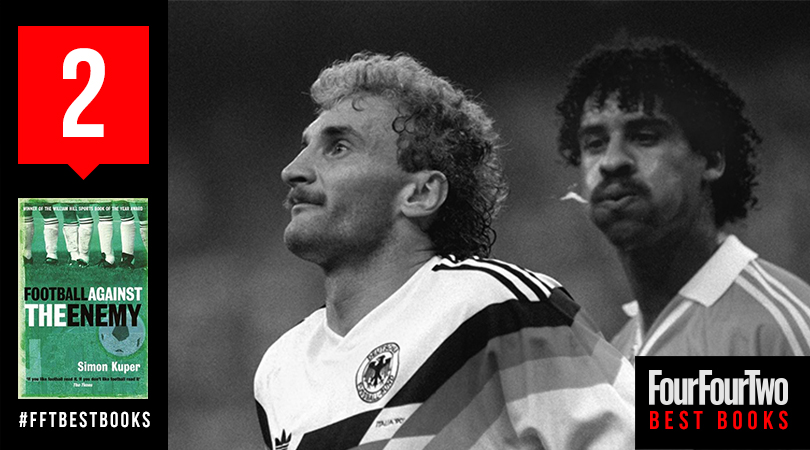
2. Football Against the Enemy
Simon Kuper, 1994
It’s hard for many to imagine a time before the mass-market penetration of the internet and satellite broadcasters, when foreigners were still a minority in the British game. Such was the parochial climate into which Simon Kuper launched his debut book – part anthropology, part travelogue, all fascinating – on football rivalries around the world.
In the course of his epic adventure, he interviewed an eclectic mix of players and officials, including an Argentine general with unique views on the way the game should be played, a Berliner who’d suffered persecution at the hands of the Stasi simply because he supported his local team, and, Cameroon star Roger Milla, who’d made headlines with his attempts to organise a tournament for pygmy tribes.
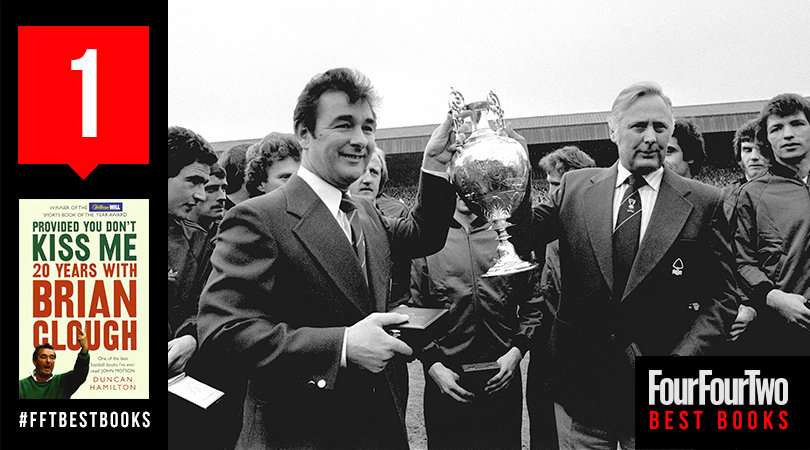
1. Provided You Don’t Kiss Me
20 Years With Brian Clough – Duncan Hamilton, 2007
“I didn’t need a f***ing motivational talk tonight. I just had to show them the s*** you’d written. Now, I’ve got a message for you. Take your f***ing portable typewriter and stick it up your a***. You’re banned. You’re f***ing banned forever from this ground.”
Two days later, Brian Clough would call Hamilton at the Nottingham Evening Post and say, “Don’t be such a stupid b*****. I didn’t mean it. Come down here and we’ll have a drink. Fancy a glass of champagne?”
This anecdote reveals Hamilton’s skill at capturing the essence of Clough: the good, the bad and the ugly. Crucially, and despite the book being based on his experiences across 20 years of professional intimacy with Clough at Nottingham Forest, Hamilton doesn’t dominate the narrative. He knows who the star of the show is: the man who’d start singing just so people would look at him.
Greg Lea is a freelance football journalist who's filled in wherever FourFourTwo needs him since 2014. He became a Crystal Palace fan after watching a 1-0 loss to Port Vale in 1998, and once got on the scoresheet in a primary school game against Wilfried Zaha's Whitehorse Manor (an own goal in an 8-0 defeat).
 Join The Club
Join The Club











